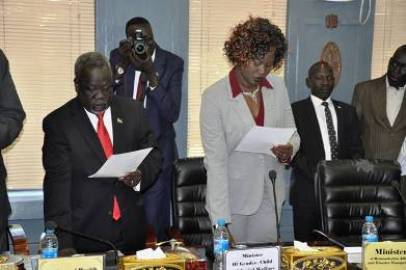Donors not providing support to South Sudan due to lack of peace implementation: SPLM-IO
May 22, 2016 (JUBA) – Major donors in the international community have not come forth to provide financial support for the operationalization of the new transitional unity government in South Sudan due to lack of progress in the implementation of the August 2015 peace agreement, opposition official has said.

It was assumed that the world would assist the economically collapsing South Sudan in stabilization of its economy and security sectors after formation of the unity government, but no financial assistance has materialized.
Citizens who have been suffering for the last two years of the civil war which erupted in December 2013 also dwelled their hope on the return of the armed opposition leader of the SPLM-IO, Machar, that the economy would have recovered and the exchange rate of the dollar against the South Sudanese Pound would have reduced.
Despite the return of Machar, economic situation has not yet improved and security situation has a lot to be desired.
However, Machar’s media official when asked by Sudan Tribune about the expected support from the international community upon his boss’ return said it was not the return to Juba of Machar per se that would have immediately brought in money and stabilize the economy, but rather the implementation of the peace agreement he had returned for.
“Without commitment from our partner in the transitional government of national unity to implement the peace agreement in letter and spirit, the situations of the economy and security in the country will not stabilize,” James Gatdet Dak, opposition leader’s spokesperson, responded to Sudan Tribune on Sunday.
“Donors may not provide the support we need until they see commitment and progress in the implementation of the peace agreement. Building confidence is important,” he added.
Dak said the ongoing reluctance by the faction of President Salva Kiir in the unity government by not addressing issues such as the cantonment of opposition forces in Equatoria and Bahr el Ghazal regions, status of 28 states as well as the dragging of their feet on reconstitution of the national parliament, among others, may continue to scar away donors.
“The unfortunate war rhetoric which has continued to come out from Bilpam will further drive away the donors,” he added, referring to recent statements by senior military officials from the army General Headquarters in Bilpam, which warned to attack the opposition forces.
He said such “negative warmongering comments” meant that money would not come from the donors and citizens would continue to suffer or civil servants and soldiers would hardly get their monthly salaries and the dollar exchange rate would continue to rise.
The opposition leader’s press secretary further added that President Kiir’s faction has continued to defy resolutions passed by the Intergovernmental Authority on Development (IGAD) and the United Nations Security Council (UNSC) to suspend the 28 states that the president unilaterally created in violation of the peace agreement which was based on the 10 states.
IGAD in its 31 January communiqué issued in the Ethiopian capital, Addis Ababa, called on the parties in the agreement to agree on the status of new states within 30 days from formation of the transitional government of national unity or simply revert to the 10 states in case of disagreement.
On Friday, the new cabinet of the unity government again suspended discussions on cantonment of opposition forces in Equatoria and Bahr el Ghazal regions, further complicating and delaying the implementation of the security arrangements across the country.
Although a new executive government has been formed and functioning for the past three weeks, a new national parliament has not yet been reconstituted to include members of other factions per the agreement, and the former parliament has continued to “illegally” operate alongside the new executive.
Dak however said the leadership of the SPLM-IO and in the person of the First Vice President, Machar, is committed to cooperate in the full implementation of the peace agreement so as to also attract donors to help stabilize both the economic and security situations in the country.
For instance, he said, the dollar exchange rate has shot up again against the South Sudanese pounds due to economy’s natural response to lack of progress in the peace deal, and particularly in the economic sector.
When Machar was arriving to Juba at the end of April, the dollar rate dropped from 38 to 28 South Sudanese pounds per a dollar in the black market. However, it has now risen again to 35 South Sudanese pounds per the dollar three weeks after his arrival.
South Sudan’s economy solely depends on imports of various commodities from foreign countries and the need for the dollar is so high.
The opposition’s leadership, he added, therefore saw it important that the parties implemented the peace deal which would also attract international partners to support the new government in stabilizing the country.
(ST)
